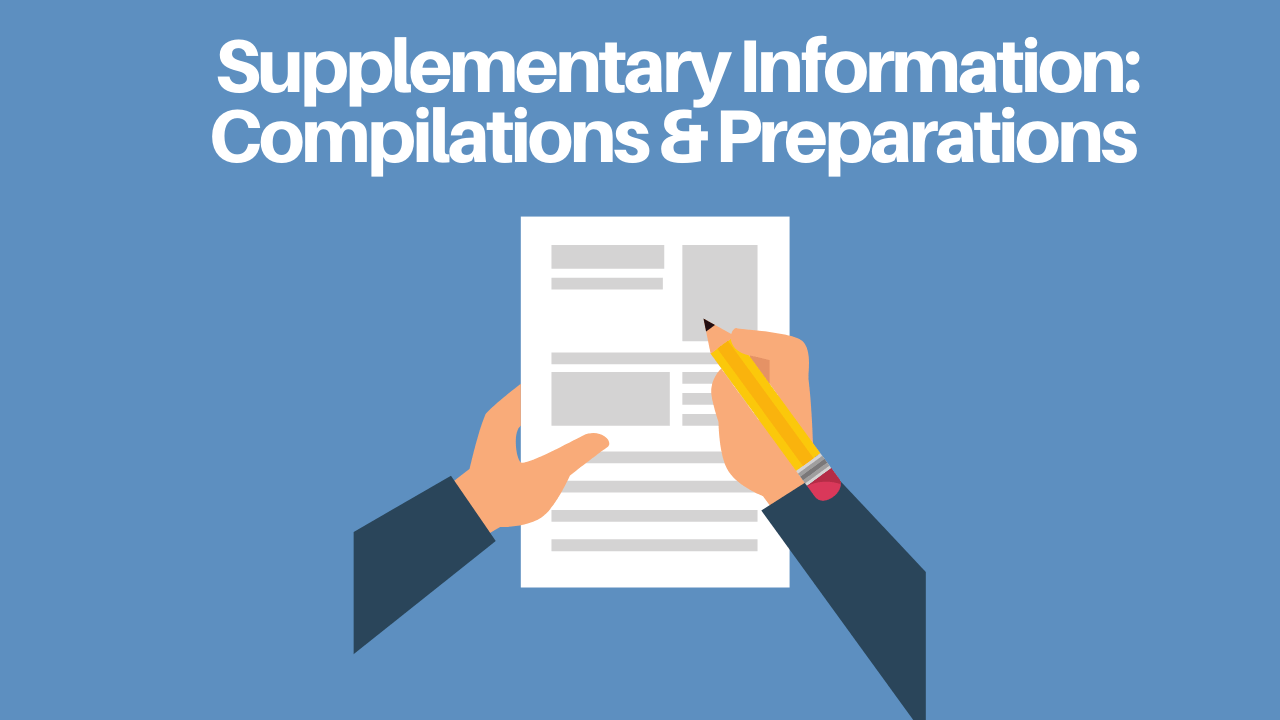
Supplementary Information: Audits
By Charles Hall | Auditing
What’s the difference in supplementary information, additional information, and required supplementary information? What language should be included in the audit opinion when such information is included in the financial statements? What audit procedures must be performed? Below I provide the answers.
1. Supplementary Information
Supplementary information is defined as information presented outside the basic financial statements, excluding required supplementary information (see below), that is not considered necessary for financial statements to be fairly-presented in accordance with the applicable financial reporting framework (e.g. FASB). (See AU-C 725 for more guidance about supplementary information.)
Supplementary information may include:
- Accounting information and
- Nonaccounting information
Supplementary information examples include:
- Detail of “Other Income” as shown in the statement of operations*
- Detail of “General and Administrative” expenses as shown in the statement of operations*
- Number of employees in a given payroll period**
* Derived from financial statements
** Not derived from the financial statements
Procedures to Perform
Procedures to be performed include:
- Determine whether the information is fairly stated, in all material respects, in relation to the financial statements as a whole
Sample Opinion Language
Example auditor’s report paragraph:
The [identify accompanying supplementary information] is presented for purposes of additional analysis and is not a required part of the financial statements. Such information is the responsibility of management and was derived from and relates directly to the underlying accounting and other records used to prepare the financial statements. The information has been subjected to the auditing procedures applied in the audit of the financial statements and certain additional procedures, including comparing and reconciling such information directly to the underlying accounting and other records used to prepare the financial statements or to the financial statements themselves, and other additional procedures in accordance with auditing standards generally accepted in the United States of America. In our opinion, the information is fairly stated in all material respects in relation to the financial statements as a whole.
For examples of presenting the supplementary language (1) in the standard opinion or (2) separately, click here.
Notice that an opinion is rendered on supplementary information. No opinion is given in regard to other information.
2. Other Information
Other information is financial and nonfinancial information (other than the financial statements and the audit report) that is included in a document containing audited financial statements and the audit report (e.g., an annual report), excluding required supplementary information. An auditor can use this option when he or she is not engaged to render an opinion on such information. (See AU-C 720 for more guidance about other information.)
Other information examples include:
- Financial summaries
- Employment data
- Planned capital expenditures
- Names of officers and directors
Procedures to Perform
Procedure to be performed:
- Reading the other information in order to identify any material inconsistencies with audited financial statements
Sample Opinion Language
The auditor can use an other-matter paragraph to disclaim an opinion regarding other information. Sample language follows:
Our audit was conducted for the purpose of forming an opinion on the basic financial statements as a whole. The [identify the other information] is presented for purposes of additional analysis and is not a required part of the basic financial statements. Such information has not been subjected to the auditing procedures applied in the audit of the basic financial statements, and accordingly, we do not express an opinion or provide any assurance on it.
3. Required Supplementary Information
Required supplementary information (RSI) is information that a designated accounting standard-setter (e.g., FASB, GASB) requires to accompany the basic financial statements. RSI is not part of the basic financial statements. However, the designated accounting standard-setter has determined that the information is an essential part of financial reporting. (See AU-C 730 for more guidance about required supplementary information.)
Required supplementary information examples include:
- Management discussion and analysis (MD&A) for governments
- Estimates of current or future costs of future major repairs and replacements for common interest realty associations
Procedures to Perform
Procedures to be performed include:
- Inquiry of management about methods used to create information
- Comparing the information for consistency with management responses and the financial statements
- Obtaining written representations from management
Sample Opinion Language
Example auditor’s report paragraph:
Accounting principles generally accepted in the United States of America require that the [identify the required supplementary information] on page XX be presented to supplement the basic financial statements. Such information, although not a part of the basic financial statements, is required by the Financial Accounting Standards Board who considers it to be an essential part of financial reporting for placing the basic financial statements in an appropriate operational, economic, or historical context. We have applied certain limited procedures to the required supplementary information in accordance with auditing standards generally accepted in the United States of America, which consisted of inquiries of management about the methods of preparing the information and comparing the information for consistency with management’s responses to our inquiries, the basic financial statements, and other knowledge we obtained during our audit of the basic financial statements. We do not express an opinion or provide any assurance on the information because the limited procedures do not provide us with sufficient evidence to express an opinion or provide any assurance.
Some governments exclude the MD&A. Here is sample opinion wording when the MD&A is omitted.
Supplementary Information in Compilations and Review Engagements
You can see information about supplementary information wording for compilation or review reports here. Also, see my post about presenting supplementary information in compilation and preparation engagements.

